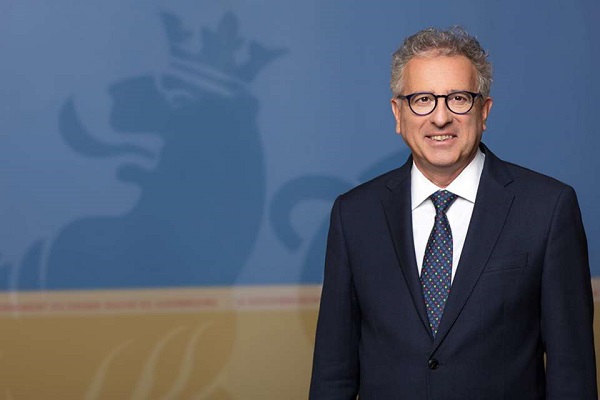 Pierre Gramegna, Luxembourg's Minister of Finance;
Credit: SIP / Yves Kortum
Pierre Gramegna, Luxembourg's Minister of Finance;
Credit: SIP / Yves Kortum
The COVID-19 crisis continued to have an impact on Luxembourg's public finances into the second quarter of 2020.
On Friday, Luxembourg's Minister of Finance Pierre Gramegna presented the budgetary situation in the second quarter of 2020 at the joint meeting of the Finance and Budget Committee and the Committee on the Control of Budgetary Implementation.
In this second quarter, government revenues fell 12.1% compared to June 2019, representing an absolute decrease of €1.2 billion. This capital loss was mainly made up of revenue losses recorded at the level of the three tax administrations amounting to a decrease of €957.6 million, which resulted fro, the general weakening of the economy and tax measures aimed at meeting the liquidity needs of businesses. In this context, the cancellations of the advances and the payment periods granted by the administration of direct contributions (Administration des contributions) correspond to a tax loss of approximately €115 million as of 30 June 2020. With regard to the exceptional reimbursements made at the level of the administration of registration, domains and VAT (Administration de l'enregistrement, des domaines et de la TVA), these amount to a total of €146 million.
In addition, there has been a significant drop in non-tax revenue, including in particular revenue from the profit of companies under private law and public law in which the state has holdings or shares.
On the other hand, government expenditure increased by 21.9% compared to June 2019. This increase, equivalent to €2.05 billion in absolute terms, is mainly linked to the impact budgetary health, social and economic measures decided by the government in the context of the COVID-19 crisis and the will of the government to keep investments at a high level. Thus, there has been a significant increase in direct and indirect investment expenses of €301.8 million, or 26.2%, compared to the same period in 2019. These expenses include, among other things, costs for crisis management in the Haut-Commissariat à la protection nationale (HCPN), particularly for medical equipment and treatment centres, for an amount of €93 million.
In addition, under the application of framework laws aimed at the structural improvement of small and medium-sized enterprises (SMEs), capital grants, which include aid granted to enterprises in the context of the health crisis, increased by €142.7 million compared to 2019. The increase in social benefits by €797.6 million (up 88.6% compared to June 2019) mainly manifested in the fund for employment covering expenses related to partial unemployment. Expenditure on the employment fund alone increased by 783.4 million, or 384.8%, compared to 30 June 2019.
Taking into account the negative scissor effect encountered in terms of the evolution of revenue and expenditure, the government balance deteriorated by around €3.3 billion compared to June 2019. Thus, public finances posted a net deficit of €2.6 billion, compared to a surplus of €669 million in 2019.
As for consolidated public debt, this amounted to around €15 billion as of 30 June 2020, which corresponds to 25.4% of GDP. Public debt therefore continues to be in line with the 30% threshold set by the government and remains largely below the 60% limit defined at European level.
Finance Minister Pierre Gramegna commented: “The government was aware from the start that the health and economic crisis linked to the spread of COVID-19 would constitute an unprecedented challenge for the Grand Duchy. Thanks to the flexibility granted by the European authorities but also to the favorable starting situation of our public finances, the government has been able to react quickly to the short-term emergencies that have appeared on so many levels. In addition, it was able to implement stimulus measures mitigating the risks of unemployment and supporting businesses with measures to promote liquidity and financial aid. This inevitably had a considerable impact on public finances, both on the central government balance and on the public debt, but at the same time strengthens the economy's ability to recover".








